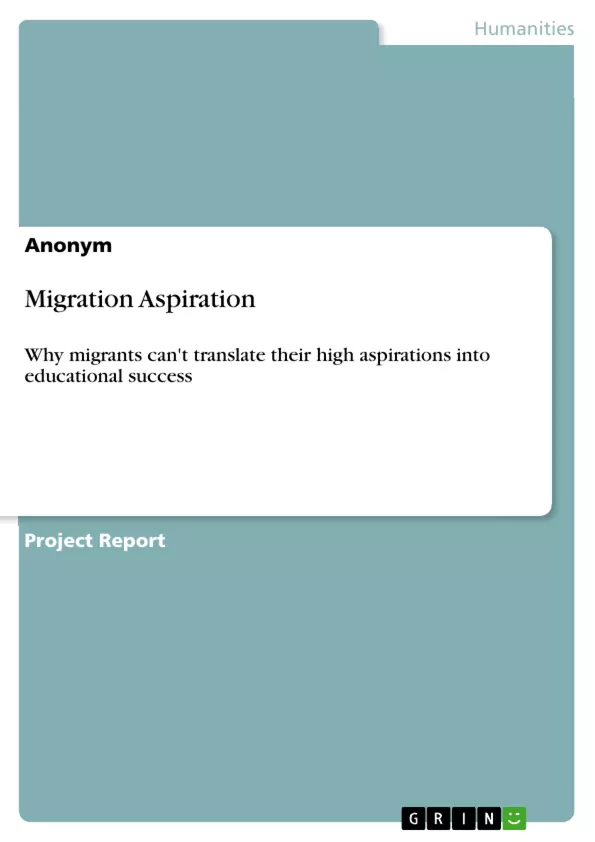A third of all children and young adults have a migrant background in Germany. These young people have a lower chance of participating and succeeding in education compared to the majority population. There seems to be many factors which are often braided and coexisted when it comes to the analysis of the mechanisms of reproduction in educational disparities.
Parental aspiration plays an essential role in the child´s education and achievement. For example: their parents are less likely to use early childhood education and care, they are less likely to attend grammar school and are less likely to graduate than their fellow students without an immigration background. In addition, their skills in reading, mathematics and science are below average in both primary and secondary schools.
Inhaltsverzeichnis (Table of Contents)
- Introduction
- "The Social Capital Theory" by Bourdieu
- State of research and the situation of the Turks
- Aspiration and its nature
- Theories explaining the Paradox
- Why migrants can't translate their high aspirations into educational success
- Summary
- Conclusion
Zielsetzung und Themenschwerpunkte (Objectives and Key Themes)
The paper aims to challenge the notion that less educated milieus have less educational aspirations, particularly among migrants. It argues that knowledge about educational institutions plays a more crucial role in educational success than parental aspirations. The paper introduces the concept of "migration aspiration" and uses it to refute the thesis that migrants from lower-class milieus have lower aspirations.
- The role of parental aspirations in educational success
- The impact of social capital on educational outcomes
- The concept of "migration aspiration" and its implications
- The relationship between educational attainment and social participation
- The influence of knowledge about educational institutions on educational success
Zusammenfassung der Kapitel (Chapter Summaries)
- Introduction: This chapter outlines the educational disadvantages faced by children and young adults with a migrant background in Germany. It highlights the role of parental aspirations in educational achievement and explores the implications of educational disadvantage on social participation in adulthood.
- "The Social Capital Theory" by Bourdieu: This chapter examines Bourdieu's theory of social capital and its relevance to educational inequality. It defines social capital as a network of relationships based on mutual recognition and discusses its characteristics and implications.
- State of research and the situation of the Turks: This chapter provides an overview of existing research on the educational aspirations and achievements of Turkish migrants in Germany.
- Aspiration and its nature: This chapter explores various theories that attempt to explain the paradox of high aspirations among migrants coupled with lower educational achievements. It examines factors such as immigrant optimism, information deficits, social capital in ethical networks, and blocked opportunities.
Schlüsselwörter (Keywords)
The paper focuses on the themes of educational aspiration, social capital, migration aspiration, educational inequality, and the situation of Turkish migrants in Germany. It also explores concepts such as immigrant optimism, information deficits, and blocked opportunities.
Frequently Asked Questions
What is "Migration Aspiration"?
Migration aspiration refers to the high educational goals often held by migrant parents for their children, which sometimes contrast with their actual social or educational standing.
Why do migrant children often face educational disadvantages in Germany?
Factors include language barriers, lack of knowledge about the German school system, and lower levels of social capital as defined by Bourdieu.
How does Bourdieu's "Social Capital Theory" apply to education?
Bourdieu argues that success in education depends on social networks and cultural resources. Migrants may lack the specific social capital needed to navigate prestigious educational institutions.
What is the "Immigrant Optimism" paradox?
It is the phenomenon where migrant families have higher educational aspirations than native families of the same social class, yet their children often achieve lower educational outcomes.
How can high aspirations be translated into success?
The research suggests that providing better information about the school system and increasing social participation are key to closing the achievement gap.
- Arbeit zitieren
- Anonym (Autor:in), 2020, Migration Aspiration, München, GRIN Verlag, https://www.grin.com/document/518513



